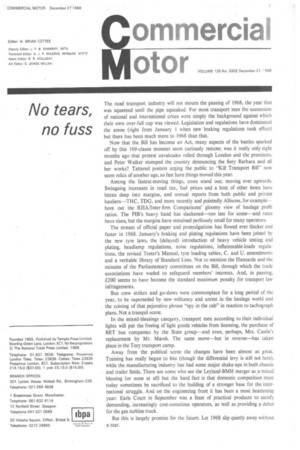No tears, no fuss
Page 9

If you've noticed an error in this article please click here to report it so we can fix it.
The road transport industry will not mourn the passing of 1968, the year that was squeezed until the pips squeaked. For most transport men the succession of national and international crises were simply the background against which their own over-full cup was viewed. Legislation and regulations have dominated the scene (right from January 1 when new braking regulations took effect) but there has been much more to 1968 than that.
Now that the Bill has become an Act, many aspects of the battles sparked off by this 169-clause monster seem curiously remote; was it really only eight months ago that protest cavalcades rolled through London and the provinces, and Peter Walker stomped the country denouncing the fiery Barbara and all her works? Tattered posters urging the public to "Kill Transport Bill" now seem relics of another age, so fast have things moved this year.
Among the fastest-moving things, costs stand out; moving ever upwards. Swingeing increases in road tax, fuel prices and a host, of other items have bitten deep into margins, and annual reports from both public and private hauliers—THC, TDG, and more recently and pointedly Allisons, for example-bore out the RHA/Inter-firm Comparisons' gloomy view of haulage profit ratios. The PIB's heavy hand has slackened—too late for some—and rates have risen, but the margins have remained perilously small for many operators.
The stream of official paper and promulgations has flowed ever thicker and faster in 1968. January's braking and plating regulations have been joined by the new tyre laws, the (delayed) introduction of heavy vehicle testing and plating, headlamp regulations, noise regulations, inflammable-loads regulations, the revised Tester's Manual, tyre loading tables, C. and U. amendments and a veritable library of Standard Lists. Not to mention the Hansards and the minutes of the Parliamentary committees on the Bill, through which the trade associations have waded to safeguard members' interests. And, in passing, £200 seems to have become the standard maximum penalty for transport law infringements.
Bus crew strikes and go-slows were commonplace for a long period of the year, to be superseded by new militancy and unrest in the haulage world and the coining of that pejorative phrase "spy in the cab" in reaction to tachograph plans. Not a tranquil scene.
In the mixed-blessings category, transport men according to their individual lights will put the freeing of light goods vehicles from licensing, the purchase of BET bus companies by the State group—and even, perhaps, Mrs. Castle's replacement by Mr. Marsh. The same move—but in reverse—has taken place in the Tory transport camp.
Away from the political scene the changes have been almost as great. Training has really begun to bite (though the differential levy is still not here), while the manufacturing industry has had some major shake-ups in both chassis and trailer fields. There are some who see the Leyland-BMH merger as .a mixed blessing (or none at all) but the hard fact is that domestic competition must today sometimes be sacrificed to the building of a stronger base for the international struggle. And on the engineering front it has been a most heartening year: Earls Court in September was a feast of practical products to satisfy demanding, increasingly cost-conscious operators, as well as providing a debut for the gas turbine truck.
But this is largely promise for the future. Let 1968 slip quietly away without a tear.












































































